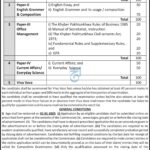Introduction
Preparing for exams can be a nerve-wracking experience. But with the right strategies and mindset, you can tackle any test confidently. Whether you’re a seasoned test-taker or someone facing exams for the first time, these tips will guide you to success.
Understanding the Exam Format
Exam Tips: Before diving into your study materials, get to know the exam format. Understanding the structure and types of questions you’ll face can give you a significant advantage.
Familiarizing Yourself with the Structure
Spend some time reviewing the exam’s layout. Is it multiple-choice, essay-based, or a mix? Knowing this helps you tailor your study approach.
Knowing the Types of Questions
Identify the common question types, such as definitions, case studies, or problem-solving scenarios. This helps you prepare for each section appropriately.
Creating a Study Schedule
Time management is crucial when preparing for exams. A well-organized study schedule ensures you cover all topics without last-minute cramming.
Importance of Time Management
Break your study sessions into manageable chunks. Allocate specific times for each subject to ensure balanced preparation.
How to Break Down Study Material
Divide your syllabus into smaller sections. Focus on one topic at a time to avoid feeling overwhelmed.
Effective Study Techniques
Studying smart is better than studying hard. Here are some proven techniques to enhance your learning.
Active Recall
This technique involves testing yourself on the material rather than passively rereading it. It helps reinforce memory and understanding.
Spaced Repetition
Revisit topics at regular intervals to improve long-term retention. Tools like flashcards can be particularly helpful.
Note-Taking Strategies
Develop your note-taking skills by summarizing information in your own words. Use visual aids like diagrams and charts to simplify complex concepts.
Utilizing Past Papers
Past papers are a goldmine for understanding the exam pattern and identifying frequently asked questions.
Benefits of Practicing with Previous Exams
Practicing past papers helps you get familiar with the timing and format. It also highlights areas where you need improvement.
How to Analyze and Learn from Mistakes
Review your answers critically. Understand why you got certain questions wrong and how to correct your approach.
Healthy Study Habits
A healthy body supports a sharp mind. Incorporate these habits into your routine to maintain peak performance.
Importance of Regular Breaks
Taking short breaks during study sessions prevents burnout and keeps your mind fresh. Try the Pomodoro Technique for effective time management.
Maintaining a Balanced Diet and Hydration
Fuel your brain with nutritious foods and stay hydrated. Avoid excessive caffeine, which can lead to energy crashes.
Managing Stress
Stress can be a major obstacle during exams. Learn how to manage it effectively to stay focused and calm.
Techniques for Staying Calm
Practice deep breathing exercises and mindfulness meditation to reduce anxiety. Regular physical activity also helps in managing stress levels.
Importance of Sleep
Don’t underestimate the power of a good night’s sleep. It’s essential for memory consolidation and cognitive function.
Group Study vs. Solo Study
Each study method has its pros and cons. Choose what works best for you or combine both for optimal results.
Pros and Cons of Studying with Others
Group study can provide different perspectives and help clarify doubts. However, it can also lead to distractions if not managed well.
Tips for Effective Group Study Sessions
Set clear goals for each session. Ensure everyone is on the same page to maximize productivity.
Using Technology Wisely
Leverage technology to enhance your study sessions but be cautious of its potential distractions.
Educational Apps and Tools
Use apps for flashcards, note-taking, and time management. Platforms like Khan Academy and Quizlet offer valuable resources.
Avoiding Distractions
Limit your time on social media and use apps that block distracting sites during study sessions.
Exam Day Preparation
The day of the exam is crucial. Here’s how to make sure you’re fully prepared.
What to Bring
Ensure you have all necessary materials like pens, pencils, calculators, and your ID. Double-check the exam guidelines for any specific requirements.
Last-Minute Revision Tips
Go over your summary notes and key points. Avoid trying to learn new material at the last minute.
During the Exam
Your performance during the exam is as important as your preparation. Stay calm and manage your time effectively.
Time Management During the Test
Allocate time for each section and stick to it. Don’t spend too long on any single question.
Techniques for Handling Difficult Questions
If you encounter a tough question, move on and return to it later. Sometimes, other questions can jog your memory.
Reviewing Your Answers
Before submitting your exam, take a few minutes to review your answers. This can help catch careless mistakes.
Importance of Double-Checking Work
Ensure that all questions are answered and check for any silly errors. Even a quick review can make a big difference.
How to Catch Common Mistakes
Look out for common pitfalls like misreading questions or simple arithmetic errors.
Post-Exam Reflection
After the exam, take time to reflect on your performance. It’s an opportunity to learn and improve.
Analyzing Performance for Future Improvement
Identify what worked well and what didn’t. Use this insight to tweak your study strategies for the next exam.
Staying Motivated for the Next Challenge
Celebrate your hard work and achievements. Use positive reinforcement to keep yourself motivated for future exams.
Conclusion
Exams are a part of academic life, but they don’t have to be daunting. With proper preparation, effective strategies, and a positive mindset, you can ace any test. Remember, success is a journey, not a destination. Good luck!
FAQs
How do I deal with exam anxiety?
Practice relaxation techniques, stay organized, and maintain a positive mindset to keep anxiety at bay.
What are the best foods to eat before an exam?
Opt for brain-boosting foods like nuts, fruits, and whole grains. Stay hydrated and avoid heavy, greasy meals.
How much should I study each day?
Quality over quantity. Aim for focused study sessions with regular breaks. Listen to your body and avoid burnout.
Can music help me focus while studying?
Yes, instrumental or classical music can enhance concentration. Avoid lyrics, as they can be distracting.
What should I do if I blank out during the exam?
Take a few deep breaths to calm down. Skip the question and come back to it later if possible.
Please don’t forget to leave a review.
Explore more by joining me on Patreon



